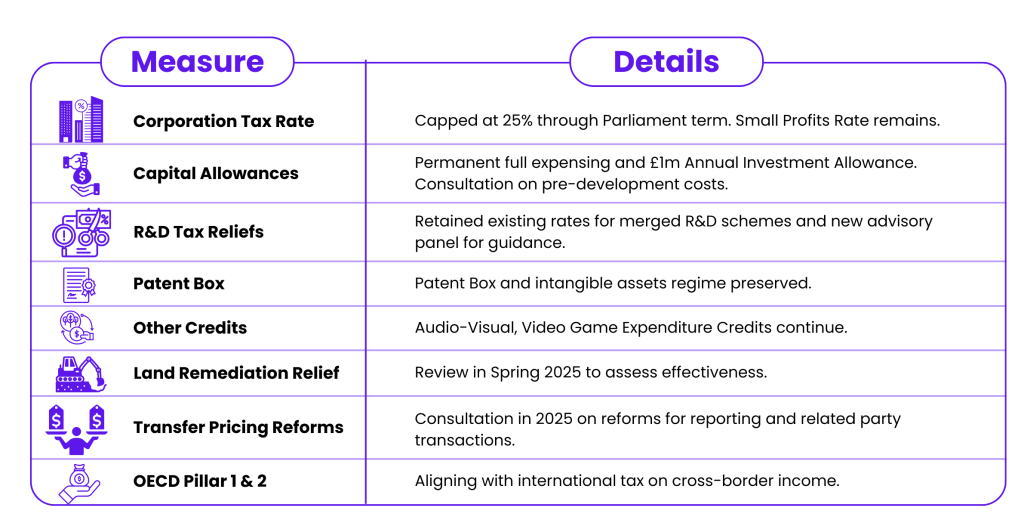The 2024 Autumn Budget introduces a broad range of reforms and adjustments impacting business taxes, personal taxes, and environmental policies. It aims to balance fiscal responsibility, climate goals, and equity in tax obligations. Business taxes focus on predictability and incentives, while personal and environmental measures push for a fairer, greener economy.
Table of Content
Below is a summary of the critical changes with charts and tables for quick reference.
Business Taxes
Business tax changes aim for stability and predictability through capped tax rates, expanded allowances, and consultations.

Business Rates and Support Measures
- Small Business Multiplier frozen at 49.9p; standard multiplier at 55.5p (based on CPI).
- RHL Properties: Reduced relief for retail, hospitality, and leisure properties from 75% to 40% in 2025-26, with a permanent multiplier reduction from 2026-27.

Green Incentives and Environmental Measures
- Green First-Year Allowances extended for zero-emission vehicles and EV charge points to 2026.
- Independent Film Tax Credit enhanced to 53% for UK films under £15m starting April 2025.
- Energy Profits Levy: Increased by 3% to 38% from November 2024, with decarbonisation allowance reduced from 80% to 66%.

Employer NIC
Employer NICs increased to 15% (up from 13.8%), with thresholds adjusted to £5,000 (Old: £9,100) and allowances increased to £10,500 (Old: £5,000).

Personal Tax Changes
National Living Wage: National Living Wage rises to £12.21 per hour for ages 21+.
Payrolling Benefits in Kind: Mandatory real-time reporting of benefits in kind from April 2026, except accommodation and loans.
Income and Capital Gains Taxes
- Income Tax: Rates and thresholds frozen until April 2028, when they will increase with inflation.
- Capital Gains Tax (CGT): Rates for non-business gains increase to 18% (lower rate) and 24% (higher rate) from October 2024.
- Carried Interest: CGT on carried interest rises to 32% in 2025, shifting to income tax framework in 2026.
New Capital Gains Tax and Carried Interest Rates

Indirect Taxes
Education and duties
- Private Education VAT at 20% on fees from January 2025.
- Fuel Duty frozen with a one-year extension on the 5p cut.
- Tobacco Duty escalator renewed at RPI+2%, with hand-rolling tobacco up by 10%.
- Vaping Products Duty at £2.20 per 10ml from October 2026.
Environmental Duties: Higher Air Passenger Duty on premium and private jet passengers, Climate Change Levy adjusted with RPI, and Carbon Border Adjustment Mechanism (CBAM) set for January 2027.
The stamp duty land tax (SDLT) surcharge for additional properties will be increased from 3% to 5% above the standard residential rates from 31 October 2024
Image Credit: Jordan Pettitt









